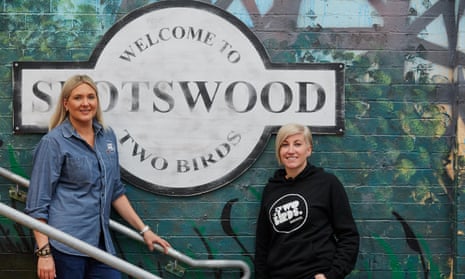Until a few years ago, an alien picking up TV signals from space would have assumed beer was a medicinal tonic for sweaty men. From Victoria Bitter’s “You can get it mowing, you can get it towing” to Carlton Mid’s ad about four guys who sneak away from their wives and party in adjoining backyard sheds, beer has long been marketed to the so-called working-class man.
But the craft beer revolution has brought a wave of entrepreneurs – and with them, a new approach. Increasing numbers of beer company founders and brewmasters are women, while beer companies have awakened to the importance of female beer drinkers, who make up a large and growing share of the craft beer market.
Stereotypes take time to change. Perth-based Pia Poynton, writer of the girl+beer blog, has been involved in the beer industry for more than a decade. She says the main prejudice she runs up against is at the beer-tasting events she runs. Often drinkers assume she is “just a promo girl” and so probably doesn’t know anything about the beer.
“People, usually men, will start to ask you a question, get halfway through and then say ‘never mind’,” she says. “It’s more irritating than frustrating.”
It happens less often now that she hosts events for Western Australian brewery Nail Brewing and is an established expert on social media. When it does happen, she takes a patient approach.
“You just encourage that conversation, that dialogue,” she says. “I don’t want people to walk away saying ‘I just got lectured’, I want them to walk away saying ‘That chick really knew what she was talking about.’”
Others are more direct. The Sparkke Change Beverage Company raised a little over $100,000 on crowdfunding platform Pozible in a campaign that ended in December. The Adelaide-based craft brewery, run by nine women, packages its beers in simple white cans with messages on them in large print that relate to various social issues, including sexism.
One is an apple cider reading “Consent can’t come after you do”. Another is a hard lemonade which reads “Nipples are nipples”. Beer, wine and cider have always been great conversation starters, the company points out on its website.
Statistics on the Australian craft beer industry are hard to come by, but there are some from more developed international craft beer markets. According to the United States Brewers’ Association, a not-for-profit based in Colorado that supports craft beer brewers and drinkers, women comprised 25% of all craft beer drinkers in 2016, while a 2014 study by Erol Sozen and Martin O’Neill at Auburn University in Alabama found women represented 29% of all brewery workers.
While fragrant IPAs, honey-brewed braggots, Belgian beers with sublime aromas and sour beers are fundamentally changing the way people view beer, Poynton says the stereotype about beer being a man’s drink is crumbling alongside the view that beer means bitter, cold, bubbly lager.
“Good food attracts men and women equally and I think craft beer does the same thing,” she says.
But the beverage industry has had its fair share of advertising scandals. In the US in 2015, a federal court in Michigan awarded Maryland-based Flying Dog Brewery the right to name a Belgian IPA “Raging Bitch” on freedom of speech grounds. The Michigan Liquor Control Commission had banned the label for being “detrimental to the health, safety and welfare of the general public”.
The same company produces a Pearl Necklace Oyster Stout, while other beers in the US sport names such as Happy Ending, Tramp Stamp and Thong Remover, leading some commentators to say the craft beer industry has a sexism problem.
There are similar instances in Australia of sex being used to sell beer, such as the busty women on Oktoberfest commercials. In Melbourne, the Bavarian Bier Cafe came under fire in 2014 for advertising its ribs using the phrase “We’ve got the best racks” and featuring women wearing low-cut dresses. Activist group Collective Shout said the advertisement treated “women like meat”.
Julia Herz, program director for the Brewers’ Association in the US, says instances of sexism are “rare bad examples in a much larger sea of good”. She argues craft beer is part of the solution, not the source of the problem. She also points to Stanford University research which surveyed more than 2,500 breweries and found 21% had at least one woman in a top role. Researchers at Stanford University confirmed these numbers, but pointed out that the rate of women being sole founders or owners is extremely small at 2-4%. The 21% figure is the result of co-founding or co-owning breweries with men.
Danielle Allen, co-owner of Melbourne-based Two Birds Brewing, says she hasn’t experienced sexism in the six years she has been running her company with business partner and brewmaster Jayne Lewis.
Despite numerous approaches from investors, Allen and Lewis own 100% of the company. People are often surprised to hear about two women owning a brewery, Allen says, but it doesn’t go further than that.
“I have not had any negative instances or thoughts and feelings because of the fact I’m a female,” Allen says. “We knew we had the right to be in the industry and we owned that.”
She and Lewis have just released a new kettle sour beer, which was launched at the Great Australian Beer SpecTAPular festival. It is bright pink, a result of fermenting with dragonfruit. The name? Slayer.

Comments (…)
Sign in or create your Guardian account to join the discussion